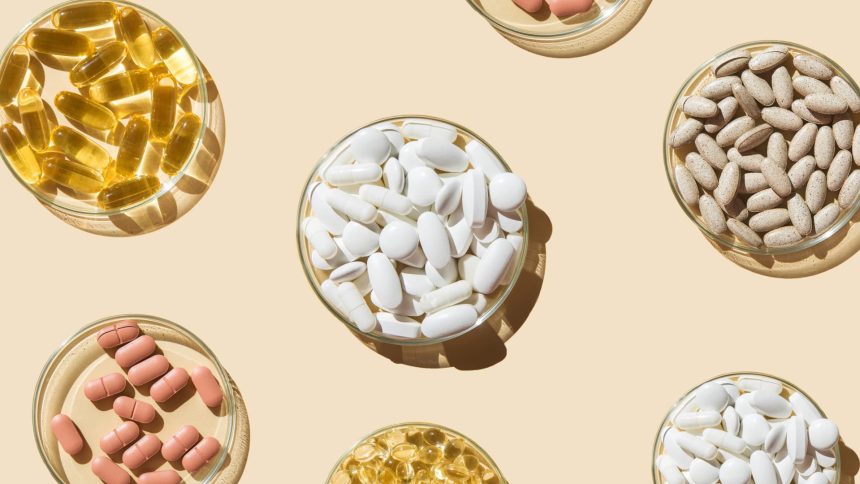From multivitamins to hair, skin and nail gummies, supplements continue to grow in popularity. But just how effective are these capsules, powders and beverages?
This year, we talked to doctors, nutritionists, dermatologists and more about the most popular supplements that people are buying and adding to their routines to get a better sense of their effectiveness.
These are the biggest takeaways from some of the most knowledgeable experts on the subject.
Biotin and collagen supplements aren’t worth buying
Research shows that many hair, skin and nail supplements have much more biotin than our bodies need. Consuming too much biotin “can alter test results that healthcare providers may order, like thyroid testing, cardiac testing [and] potentially even vitamin D testing,” Dr. Rebecca Hartman, an assistant professor of dermatology at Harvard Medical School, told CNBC Make It in July.
Getting biotin and collagen the natural way, through a balanced diet, is a much better and safer way to get those vitamins. Experts suggest eating foods high in biotin and collagen like beans and dairy, especially egg yolks.
Magnesium supplements won’t help you sleep better
Unless you have a magnesium deficiency or aren’t getting enough in your diet, magnesium supplements won’t help you fall asleep, according to Shelby Harris, a licensed clinical psychologist and director of sleep health at Sleepopolis.
In fact, getting too much magnesium can negatively impact your health and cause side effects like heartbeat irregularities or kidney issues, Harris said in July. Instead of taking magnesium supplements, get the mineral from your diet by eating foods like spinach, peanut butter and bananas.
Berberine may help with weight loss
Earlier this year, berberine was being touted as “nature’s Ozempic” on TikTok. The natural compound, which is found in several plants, can lower blood sugar levels and may lead to weight loss, according to Neil Paulvin, a NY-based longevity and regenerative medicine doctor.
But berberine isn’t exactly on par with Ozempic when it comes to weight loss: “Patients maybe lose two to four pounds a month at max, if not less,” Paulvin said in June. “With Ozempic, people are losing five to 12, sometimes up to 16 pounds a month.”
A serving of sea moss a day would serve you well
Sea moss is nutrient-dense and includes vitamins A, C and E as well as some B vitamins, Samar Kullab, a registered dietitian nutritionist in the Chicago area, told CNBC Make It in June.
Eating a spoonful of sea moss gel a day can lead to reduced inflammation and improved thyroid function, heart health and gut health, Kullab said. Though, those who have thyroid issues should avoid taking it, she added.
Not everyone needs to take multivitamins
If you’re eating the right foods and getting your vitamins from your diet, you don’t need to take a multivitamin, Dr. Elizabeth Ko, an internist and medical director of the UCLA Health Integrative Medicine Collaborative, said in November.
Following a Mediterranean diet rich in beans, whole grains, fresh fruits and vegetables can help you get those nutrients. Vegans, vegetarians, people with stomach issues or those with nutrient deficiencies may benefit from adding a multivitamin to their daily regimen, Ko said.
Taurine needs to be tested on humans
Taurine is an amino acid naturally produced by humans that is being studied for its potential anti-aging effects. Though taurine shows promise, it’s only been proven to increase longevity in mice.
It’s also still unknown if there are any long-term side effects from taking taurine supplements, Paulvin told CNBC Make It in August. “The best anti-aging supplement is exercise, especially high-intensity exercise with weights, three times a week,” he said. “Optimizing your sleep and your circadian rhythm [too].”
Vitamin C and D supplements aren’t the best way to boost immunity
Vitamin C and vitamin D may help to support the function of your immune system, but there’s more evidence to support the effectiveness of vitamin D supplements than vitamin C. Still, these supplements work best for people with vitamin C or vitamin D deficiencies, according to Dr. Michael Ben-Aderet, an infectious disease specialist and associate medical director of Hospital Epidemiology at Cedars-Sinai Medical Center.
For a generally healthy person, Ben-Aderet advised boosting your immune system by eating a healthy, balanced diet, exercising, prioritizing sleep and staying up-to-date with your vaccinations.
Without this key ingredient, turmeric supplements aren’t effective
The active ingredient in turmeric that’s associated with the health benefits people are hoping for is called curcumin. But most turmeric supplements have really small percentages of curcumin, around two to six percent, Ko said in August.
“Should you have a choice between turmeric [supplements] and curcumin [supplements], I would opt for the curcumin,” Ko said. Pair curcumin supplements with black pepper and healthy fats like yogurt to get the most benefit, she noted.
Ashwagandha is ‘very effective’ at lowering stress
Ashwagandha is a staple in Ayurvedic medicine and has been used for thousands of years. The strongest proven benefits of using the herb are for stress relief and anxiety management, said Dr. Meena Makhijani, an integrative medicine physician at UCLA Health and board-certified Ayurveda practitioner.
However, its best to take breaks from taking ashwagandha every “three months or so,” Makhijani said in December. “If it’s used in a proper way, it would be very beneficial for most people [to take breaks].”
Be careful about where you buy your supplements
Across the board, experts warned that supplements aren’t closely regulated by the Food and Drug Administration.
Hartman told CNBC Make It that it’s important to ask yourself these questions before taking any supplement:
- Does it actually have the active ingredients it claims to have?
- What evidence supports using this particular amount of this particular product?
- Is this a trusted company to buy this specific product from?
- Has it been third-party tested, and does it contain any contaminants?
- Have I checked in with my doctor before taking it?
DON’T MISS: Want to be smarter and more successful with your money, work & life? Sign up for our new newsletter!
Get CNBC’s free Warren Buffett Guide to Investing, which distills the billionaire’s No. 1 best piece of advice for regular investors, do’s and don’ts, and three key investing principles into a clear and simple guidebook.
Read the full article here




